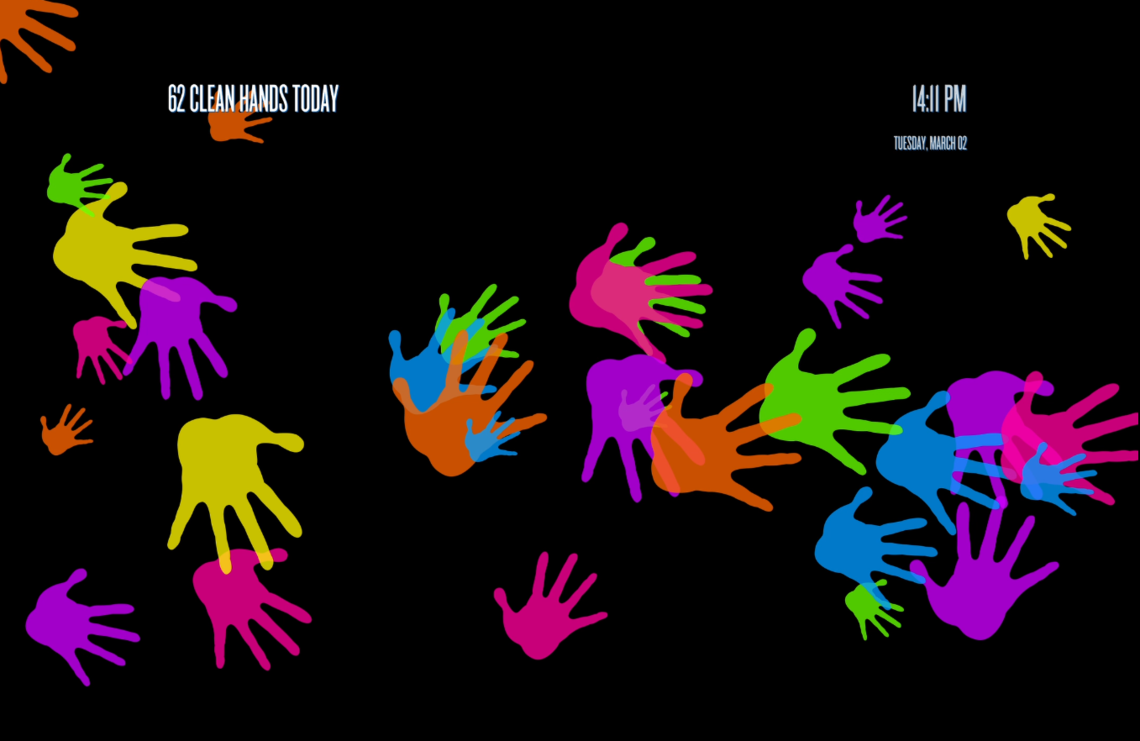March 17, 2021
As COVID-19 vaccines roll out, clean hands remain a priority

University of Calgary researchers are using social innovation to help promote hand hygiene in public places where soap and water may not be available.
Merging art, science and engineering, the technology uses interaction design to encourage people to clean their hands. A sensor inside an alcohol-based rub (ABR) wall-mounted dispenser reacts when the pump is used, signalling a visual representation on a nearby display.
“The use of ABR dispensers is a proven and effective way to improve hand hygiene,” says Dr. John Conly, MD, medical director at the Cumming School of Medicine’s W21C Research and Innovation Centre. “Using technology, art and interaction design we’ve come up with an outside-the-box solution that could be implemented into clinical environments.”
Proper hand hygiene is a simple, effective way to help limit the spread of viruses, including COVID-19. Hand washing with hot water and soap is the preferred method to remove germs, but when on the move, using an ABR is an immediate solution.

John Conly stands in front of a demo of the interaction design setup. Conly believes this social innovation could help promote hand hygiene education in schools.
Kelly Johnston, Cumming School of Medicine
After viewing an early prototype from Emily Carr University of Art + Design (ECUAD) in Vancouver in 2015, W21C partnered with ECUAD to take the visual art display and adapt it to encourage and measure hand hygiene compliance in hospitals in Calgary.
Over time, the technology has been improved by W21C to include customizable visual themes, so when a sensor is activated it can now trigger the appearance of dinosaurs, Canadian animals, vehicles, or even cause “germs” on the display to be “squashed”. Other improvements to the technology include smaller and more reliable sensors, a lightweight and adaptable networking system, extended battery life and remote monitoring capabilities.
Digital Media, Advancement
W21C has trialed the interactive hand hygiene innovation in two hospitals in Calgary. Researchers found a 46 per cent increase in frequency of use at one site. Patients and staff also noted an increase in both awareness and community engagement, with 75 per cent of those interviewed saying the interactive system increased their awareness of hand hygiene practice.

Colourful hands are one of the customizable visual themes that can be displayed when a person uses an ABR dispenser connected to the software.
This spring will see the development of the next iteration of the technology, focusing on ease of use and scalability. W21C is engaging the support of an engineering student as well as Dr. Simon Li, PhD, associate professor, Department of Mechanical and Manufacturing Engineering for the next stage of prototype development.
Increasing the accessibility of this technology regardless of income or location is the goal for the research team. “This exciting innovation continues to provide a low-cost solution for hand hygiene with publicly accessible software and an easy-to-use installation guide,” says Conly.
Conly believes this innovation could also play a role in hand hygiene education in schools. “With mask-wearing compliance in children being at times difficult, it is more important than ever for kids to engage in proper hand hygiene,” he says.
W21C is continuing to study the effects of interaction design on hand hygiene practices and is looking for future test sites in the community to deploy the technology.
Celebrate social innovation with UCalgary
Social innovation is uncovering new solutions to global, social and environmental problems. Increase your social impact — check out a week of social innovation activities at UCalgary from March 15-19 to celebrate the launch of the new UCeed Social Impact Fund.
John Conly is a professor in the departments of Medicine, Pathology and Laboratory Medicine, and Microbiology, Immunology and Infectious Diseases and member of O’Brien Institute for Public Health, and the Snyder Institute for Chronic Diseases at the Cumming School of Medicine. He is the medical director of the W21C Research and Innovation Centre.






